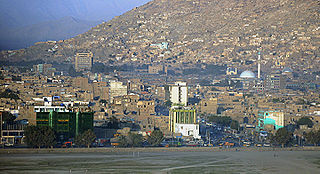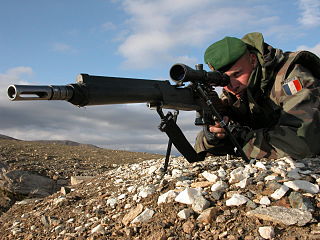The Bonn Agreement was the initial series of agreements passed on December 5, 2001 during an international conference on Afghanistan held in Bonn. It was intended to re-create the Islamic State of Afghanistan following the U.S. invasion of Afghanistan that followed the September 11, 2001, terrorist attacks. Since no nationally agreed-upon government had existed in Afghanistan since 1979, it was felt necessary to have a transition period before a permanent government was established. A nationally agreed-upon government would require at least one loya jirga to be convened; however, in the absence of law and order in the wake of the rapid victory of American and Afghan Northern Alliance forces, immediate steps were felt to be required.
United Nations Security Council Resolution 1746, adopted unanimously on March 23, 2007, after reaffirming all resolutions on the situation in Afghanistan, including resolutions 1659 (2006) and 1662 (2006), the Council extended the mandate of the United Nations Assistance Mission in Afghanistan (UNAMA) for an additional period of twelve months, until March 23, 2008.

United Nations Security Council resolution 1378, adopted unanimously on 14 November 2001, after reaffirming all resolutions on the situation in Afghanistan, including resolutions 1267 (1999), 1333 (2000) and 1363 (2001), the Council affirmed that the United Nations would play an important role in the country and called for the establishment of a transitional administration leading to the formation of a new government.

United Nations Security Council resolution 1383, adopted unanimously on 6 December 2001, after reaffirming all resolutions on the situation in Afghanistan, particularly Resolution 1378 (2001), the Council endorsed the Bonn Agreement signed the previous day concerning the transition period in the country following the U.S. invasion and preceding the establishment of permanent institutions.

United Nations Security Council resolution 1386, adopted unanimously on 20 December 2001, after reaffirming all resolutions on the situation in Afghanistan, particularly resolutions 1378 (2001) and 1383 (2001), the Council authorised the establishment of the International Security Assistance Force (ISAF) to assist the Afghan Interim Authority in the maintenance of security in Kabul and surrounding areas. It was the final Security Council resolution adopted in 2001.

United Nations Security Council resolution 1401, adopted unanimously on 28 March 2002, after recalling all previous resolutions on the situation in Afghanistan, including resolutions 1378 (2001), 1383 (2001) and 1386 (2001), the Council endorsed the establishment of the United Nations Assistance Mission in Afghanistan (UNAMA). It would replace the longstanding United Nations Special Mission to Afghanistan.

United Nations Security Council resolution 1413, adopted unanimously on 23 May 2002, after reaffirming all resolutions on the situation in Afghanistan, particularly Resolution 1386 (2001) and resolutions 1368 (2001) and 1373 (2001) on terrorism, the council extended the authorisation of the International Security Assistance Force (ISAF) for an additional six months beyond 20 June 2002.

United Nations Security Council resolution 1419, adopted unanimously on 26 June 2002, after reaffirming all resolutions on the situation in Afghanistan, particularly Resolution 1383 (2001) and resolutions 1368 (2001) and 1373 (2001) on terrorism, the Council commended the country for the successful conduct of an emergency loya jirga and called for co-operation from the Afghan people with the Transitional Administration.
United Nations Security Council resolution 1444, adopted unanimously on 27 November 2002, after reaffirming all resolutions on the situation in Afghanistan, particularly resolutions 1386 (2001) and 1413 (2002) and resolutions 1368 (2001) and 1373 (2001) on terrorism, the council extended the authorisation of the International Security Assistance Force (ISAF) for a period of one year beyond 20 December 2002.

United Nations Security Council resolution 1464, adopted unanimously on 4 February 2003, after reaffirming its commitment to the sovereignty, territorial integrity and unity of Côte d'Ivoire, the council called for the implementation of the peace agreement signed at Linas-Marcoussis to end the civil war in the country.

United Nations Security Council resolution 1471, adopted unanimously on 28 March 2003, after reaffirming all resolutions on the situation in Afghanistan, the Council extended the mandate of the United Nations Assistance Mission in Afghanistan (UNAMA) for an additional period of twelve months until 28 March 2004.

United Nations Security Council resolution 1479, adopted unanimously on 13 May 2003, after reaffirming Resolution 1464 (2003) on the situation in Côte d'Ivoire and resolutions 1460 (2003) and 1467 (2003), the council established the United Nations Mission in Côte d'Ivoire (MINUCI) after determining the situation in the country to be a threat to international peace and security in the region.

United Nations Security Council resolution 1510, adopted unanimously on 13 October 2003, after reaffirming all resolutions on the situation in Afghanistan, particularly resolutions 1386 (2001), 1413 (2002) and 1444 (2002), and resolutions 1368 (2001) and 1373 (2001) on terrorism, the council extended the authorisation of the International Security Assistance Force (ISAF) for a period of one year and expanded its operations outside the capital Kabul to other areas.

United Nations Security Council resolution 1536, adopted unanimously on 26 March 2004, after reaffirming all resolutions on the situation in Afghanistan, particularly Resolution 1471 (2003), the council extended the mandate of the United Nations Assistance Mission in Afghanistan (UNAMA) for an additional period of twelve months until 26 March 2005.

United Nations Security Council resolution 1563, adopted unanimously on 17 September 2004, after reaffirming all resolutions on the situation in Afghanistan, particularly resolutions 1386 (2001), 1413 (2002), 1444 (2002) and 1510 (2003), and resolutions 1368 (2001) and 1373 (2001) on terrorism, the council extended the authorisation of the International Security Assistance Force (ISAF) for a further period of one year.

United Nations Security Council resolution 1589, adopted unanimously on 24 March 2005, after reaffirming all resolutions on the situation in Afghanistan, particularly Resolution 1536 (2004), the council extended the mandate of the United Nations Assistance Mission in Afghanistan (UNAMA) for an additional period of twelve months until 24 March 2006.

United Nations Security Council resolution 1623, adopted unanimously on 13 September 2005, after reaffirming all resolutions on the situation in Afghanistan, particularly resolutions 1386 (2001), 1413 (2002), 1444 (2002), 1510 (2003) and 1563 (2004), and resolutions 1368 (2001) and 1373 (2001) on terrorism, the council extended the authorisation of the International Security Assistance Force (ISAF) until mid-October 2006.

United Nations Security Council Resolution 1974, adopted unanimously on March 22, 2011, after recalling previous resolutions on Afghanistan, in particular 1917 (2010), the Council extended the mandate of the United Nations Assistance Mission in Afghanistan (UNAMA) for a period of one year until March 23, 2012.

United Nations Security Council Resolution 1659, adopted unanimously on February 15, 2006, after recalling previous resolutions on the situation in Afghanistan, particularly resolutions 1378 (2001), 1383 (2001) and 1589 (2005), the Council endorsed the "Afghanistan Compact" between the Afghan government and international community concerning the future of the country.

United Nations Security Council Resolution 1662, adopted unanimously on March 23, 2006, after reaffirming all resolutions on the situation in Afghanistan, including resolutions 1589 (2005) and 1659 (2006), the Council extended the mandate of the United Nations Assistance Mission in Afghanistan (UNAMA) for an additional period of twelve months.















